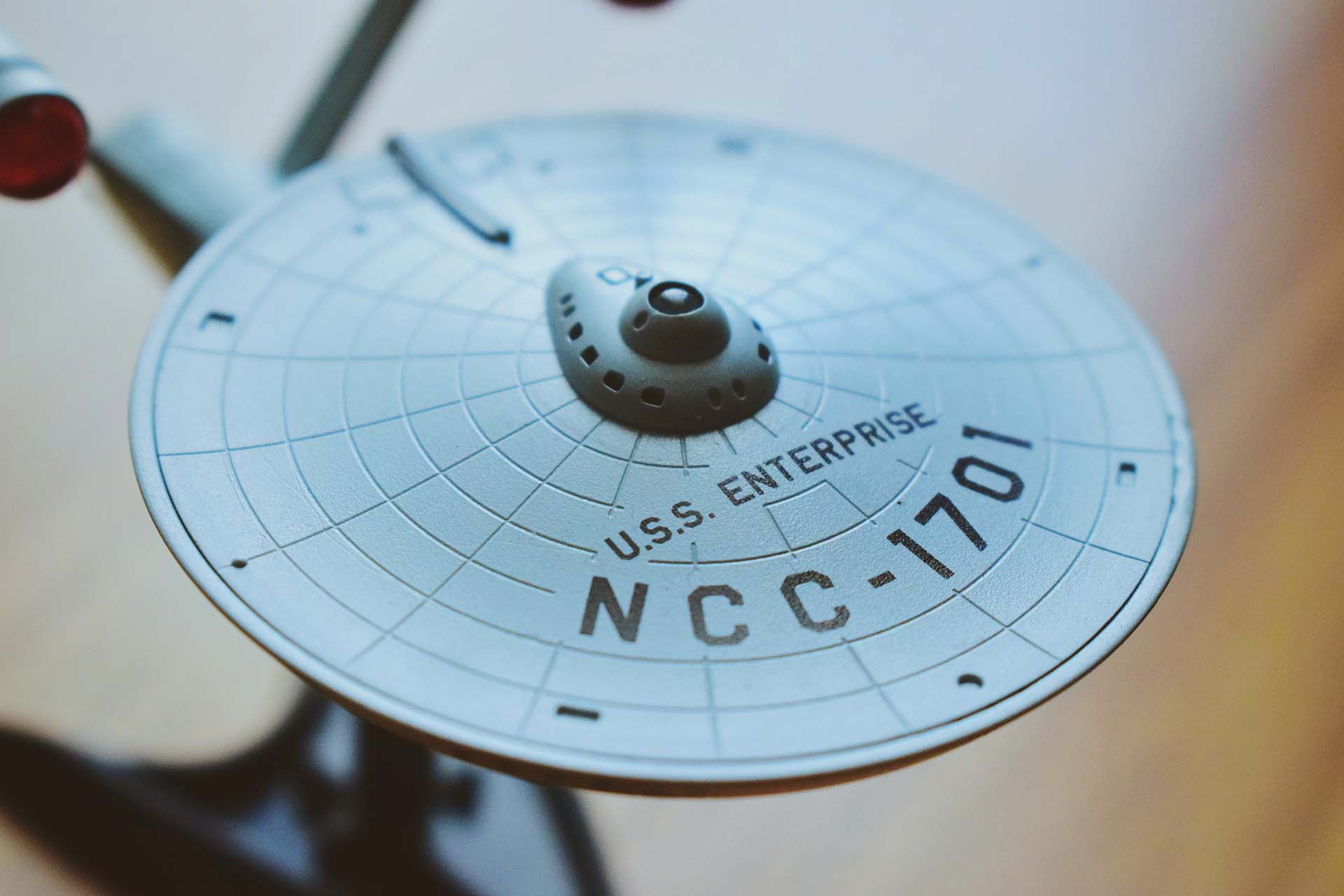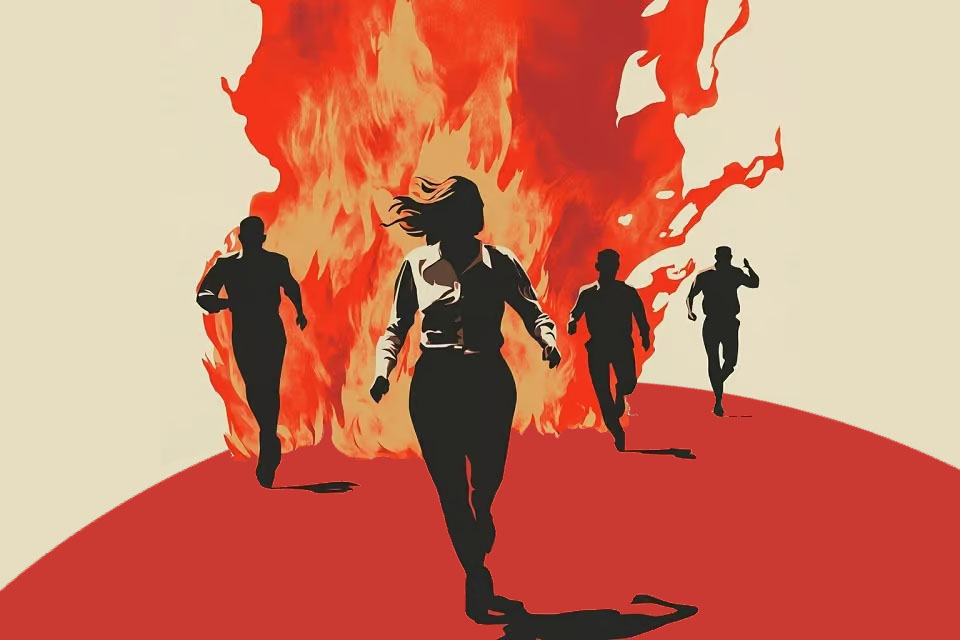Why young and old are stronger together
The value of the old in a new world: A Star Trek parable
Last week, Tele 5 aired an exciting episode of Star Trek The Next Generation. In it, the 24th-century Enterprise encounters the Scotty of the Enterprise from Season 1, which plays in the 23rd century. Right at the beginning, the crew of the new spaceship frees the experienced engineer from a transporter buffer in which he was stuck for over 70 years – without aging – on his way into retirement.
What happens in this episode is once again a thrillingly presented lesson in how to deal with current crises and uncertainty in a solution-oriented way, and how old and young work together within organisations.
A pensioner-to-be meets a motivated young engineer
Visibly aged compared to season 1, Scotty is initially fascinated by the development of the Enterprise. At the same time, this creates a feeling of being overwhelmed and of falling out of time. This feeling is intensified by the young on-board engineer Geordi La Forge, who gives the ‘old man’ the feeling that he is disturbing him with his questions during important tasks. Scotty understandably withdraws and spends his time with holographic projections of ‘his’ Enterprise and good old drinks.
Captain Picard, the commander of the ship, shows compassion and recognises that old Scotty feels useless and probably also superfluous. He motivates Geordi to carry out a seemingly less urgent mission with Scotty and to get Scotty’s completely outdated spaceship back into operation. Geordi hesitates and only allows himself to be persuaded to accept the assignment after being told that everyone wants to be useful.
Shortly after Scotty and Geordi have left the Enterprise and beamed up to the old ship, the Enterprise is drawn into a kind of trap (a Dyson sphere) from which it cannot escape on its own. When Geordi and Scotty recognise this, they manage, after initial doubts (especially on Geordi’s part), to transport the Enterprise through a kind of gate out of the sphere, together and with the help of the old ship, which has since been reactivated. In doing so, they not only combine their old (Scotty) and new (Geordi) knowledge, but the ‘old’ man even motivates the ‘young’ man to take risks and face the uncertainties of the future despite his ship’s outdated technology. The Enterprise is freed, the old ship is destroyed, Geordi and Scotty are of course saved – and as always, everyone is relieved and happy at the end.
Old and young together or against each other?
This episode stayed with me for a few days, even though it wasn’t the first time I’d seen it. But today it is more relevant than ever before in my life.
Of course, the focus is on the perceived usefulness of the individual. Today, we also talk about the meaning that we want to recognise in our lives in order to be happy. And just as obvious is the generational aspect, where some feel ‘outdated’ and others feel disturbed. We experience all of this daily in the workplace, where old and young meet.
The older ones may have many years of experience, but from the younger ones’ point of view they are often no longer up to date or even a nuisance. The young, on the other hand, are well educated for the modern age and are experienced in using new technology. The older ones can’t seem to keep up. Scotty puts it this way: ’I used to be able to tell how my Enterprise was doing by the vibration of the deck plates, but with the new technology that’s impossible.’ So his experience is worthless, he thinks – and this attitude connects him with Geordi, who sees it quite similarly. We also see this in companies, where the experience of older people is seemingly useless because they no longer have a command of innovative technologies and ways of working.
And we also know the compassionate manager – the company Picard – who wants to give the older employee the feeling of being needed one more time before sending them into retirement.
Retiring with a good feeling
This is where the episode could end with the morality that can be observed so often today: the old man, whose knowledge and experience no longer seem to be of any use because they are outdated, and whose sense of new technologies is missing, meets a caring manager who gives him the feeling of being needed once again. What follows is a happy retirement on a beautiful planet. That’s it: the old man wisely retreats over the bridge that has been built and happily enjoys the joyful and low-work retirement existence – a kind of cruise idyll à la science fiction.
And this is precisely the vision that many companies and employees follow today. The old (and by that I mean people in their mid-50s at the latest) are offered the (early) transition to retirement and are happy to finally be able to stop. In the best case, they are given the feeling of being needed again – even if it’s only to give younger people a chance at a job. Sometimes they are even allowed to work a little longer because they are still a bit young for retirement, they are given low-priority tasks to keep them busy, along the lines of ‘they can still manage that’. Everyone is happy: the young because the old are not getting in the way, and the old because they will soon be able to enjoy their retirement and, in the best case, still feel a little useful.
A slightly different story
But wait, the episode initially suggests this course of events, but then things take a completely different turn, because suddenly the unknown appears on the scene in the form of a crisis. The Enterprise is drawn into the unknown sphere and, in retrospect, its modern technology is what gets it into trouble. It is trapped and cannot get back, as the gate to the sphere closes behind it.
Meanwhile, Geordi and Scotty are repairing Scotty’s outdated spaceship outside the sphere. They soon discover that the mother ship has been lost. Geordi is on the verge of giving up, but Scotty convinces him that there is always a solution, even when resources and opportunities are limited. Scotty shows courage and confidence and thus inspires Geordi. Together, using knowledge from the old and new, they manage to reactivate the wrecked ship and then use the old ship to hold off access to the sphere until the Enterprise can pass through the gate.
What a brilliant image: the old keeps the door open for the new in a crisis. Old and young work together. And how ingenious is the small but subtle reference to deceleration, because the old ship is not pulled into the sphere by the use of conventional, slow propulsion.
Scotty and Geordi are beamed back to the Enterprise at the last moment before the closing gate destroys the old ship.
All’s well that ends well, the experienced business person thinks to himself at this point at the latest. Now old Scotty can still fly to his retirement planet in peace and start his well-deserved retirement there. Picard even provides him with an Enterprise shuttlecraft as a token of his gratitude.
And what does Scotty do instead? He announces that he still enjoys discovery and adventure. And maybe there is still a role for him to play somewhere. He gladly accepts his new toy and flies off into the unknown to discover new worlds. There will be plenty of time for retirement later on.
Parable or fantasy?
A rather big difference to what we know from companies today, a perspective that seems unusual to us at first glance, more fantasy than reality, but one that contains interesting aspects for an appropriate corporate culture in times of crisis.
Today, our economy is under threat, many companies are in a state of upheaval, some are facing an existential crisis. In my coaching sessions and among my friends, I see that people become difficult to place in their early to mid-50s at the latest, find no place in young, hip start-ups, and are sorted out and made redundant in large corporations.
Many of those who are already over 60 fly relaxed to the retirement planet and enjoy life. Those who still want to work or have to work for reasons of age are often ridiculed for their outdated knowledge and, not unexpectedly, emphasise their past successes – by the way, this pattern is also shown in the episode at the beginning of the Scotty-Geordi relationship.
Conclusion
The Star Trek The Next Generation episode invites us to change our perspective, which I would like to recommend to companies:
the old can open the door to the new, especially in times of crisis. It slows down the process in phases (and sometimes involuntarily), which is more than helpful in a crisis. In crisis management, the old and familiar can break, and sometimes it is necessary to consciously let go of it. However, it is not worthless or ready for the museum. The old ones themselves can continue with new tools/processes. They may no longer fly large spaceships, but they are certainly good enough for a flight in a small shuttle. And so the opportunity arises for the old ones, like Scotty, to invent something really big for the grandchildren’s generation (for Scotty it was transwarp technology).
Diversity of perspective is not only a question of gender, skin colour and species (culture), but also a question of young and old in the sense of technologically in- and outdated.
Self-knowledge also plays an important role. It takes courage to admit to yourself that you can no longer keep up in certain areas. At the same time, this realisation can lead to trusting in proven strengths – such as the ability to find solutions in difficult situations and not to give up prematurely. Those who have mastered crises for years bring valuable knowledge with them that can be invaluable, especially in uncertain times.
Being older does not necessarily mean having less self-confidence and courage to face the unknown. The experience of having been through a lot can be crucial to success in critical and unknown situations. And courage to face the unknown is a good basis for discovering new things even in old age.
And last but not least: good leaders sometimes motivate under completely false assumptions, but above all they motivate people to work together and embrace (intergenerational) diversity.
Notes:
If you like the article or would like to discuss it, please feel free to share it in your network. And if you have any comments, please do not hesitate to send us a message.
Astrid Kuhlmey has published further articles in the t2informatik Blog, including:

Astrid Kuhlmey
Computer scientist Astrid Kuhlmey has more than 30 years of experience in project and line management in pharmaceutical IT. She has been working as a systemic consultant for 7 years and advises companies and individuals in necessary change processes. Sustainability as well as social and economic change and development are close to her heart. Together with a colleague, she has developed an approach that promotes competencies to act and decide in situations of uncertainty and complexity.
In the t2informatik Blog, we publish articles for people in organisations. For these people, we develop and modernise software. Pragmatic. ✔️ Personal. ✔️ Professional. ✔️ Click here to find out more.


